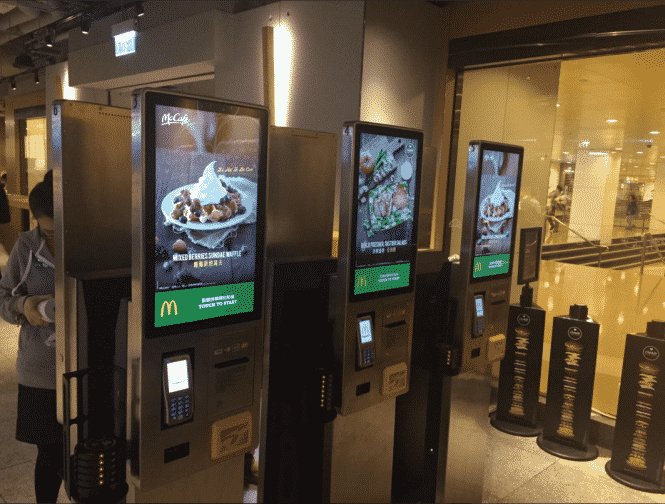
Automation Comes To McDonald’s Kiosks – NPR
We hear a lot about robots eventually taking over jobs in manufacturing, but automation has already hit the service industry. The cashier who takes your order at McDonald’s could soon be replaced.
DAVID GREENE, HOST:
So there are more than 3 million cashiers in the United States. For many, working a register is a first job; for some, it’s a career. But advancements in technology are replacing cashiers with screens, even in some of the most iconic restaurants. Reporter Ally Schweitzer of WAMU visited one.
ALLY SCHWEITZER, BYLINE: I’m inside a McDonald’s watching sandwiches roll by alluringly on a screen.
CARLOS MATEOS JR.: From here, you have a real simple menu here. And you can see burgers, chicken and fish. Or I could go to my all day breakfast.
SCHWEITZER: Carlos Mateos Jr. owns this McDonald’s in Arlington, Va., and he’s showing me how to place an order with one of the restaurant’s new touchscreen kiosks. Mateos says the technological upgrade is about giving customers what they want.
MATEOS: They wanted conveniences. They wanted different ways of ordering their foods.
SCHWEITZER: McDonald’s says about a third of its locations across the country have already introduced kiosks. By 2020, it plans to have touchscreen ordering in all its U.S. restaurants, catching up to the many big-box retailers, pharmacies and grocery stores that introduced similar technology years ago. But over time, says Molly Kinder, all this automating could have a major impact on jobs. Kinder advises on the future of work at the public policy think tank New America foundation. She says there’s been a lot of talk about how automation could eliminate jobs in sectors like manufacturing and transportation…
MOLLY KINDER: But actually positions like cashiers, retail sales person are at very high risk of automation.
SCHWEITZER: Kinder says it’s not clear how long it could take for those jobs to be outsourced to machines. But she says about a third of all jobs in cities such as Indianapolis, Phoenix and Detroit are vulnerable to technological displacement over time. And those jobs often share certain qualities.
KINDER: The lowest skilled, lowest educated and least-paid jobs tend to be much higher risk than higher skilled and higher paid jobs.
SCHWEITZER: A big driver of the automation craze – Amazon. The online retailer rocked the grocery world when it bought Whole Foods last year. And companies scrambled to show investors that they, too, are going high tech. John Marshall is an economist with United Food and Commercial Workers International, a union that represents grocery store employees.
JOHN MARSHALL: Wall Street analysts are really demanding that companies make these kinds of investments.
SCHWEITZER: And he says, while automation hasn’t led to widespread layoffs at grocery stores, workers’ hours are being cut. He says the more companies spend on technology, the more pressure they face to slash labor costs.
MARSHALL: And ironically, this is having really a negative effect in terms of these companies’ ability to compete with e-commerce retailers like Amazon because the quality of customer service is going to decline as that staffing level is cut.
SCHWEITZER: But back at the McDonald’s in Arlington, Carlos Mateos Jr. says customers seem to have embraced the new touch screens.
MATEOS: There’s people that they come in with their headphones, they don’t want to talk to anybody, they make a beeline right to the kiosk and off they go.
SCHWEITZER: And Mateos says at his restaurant, kiosks haven’t triggered layoffs. He still has human cashiers for those who don’t want to use the touchscreens. And new features like mobile ordering have boosted sales. So he’s had to hire more staff.
MATEOS: And we’ve increased by one to two people and especially two to three people during peaks.
SCHWEITZER: Mateos also needs employees to fill one of the fast food restaurant’s newest jobs – server. When McDonald’s introduced kiosks, it also introduced table service. So while ordering a Big Mac from a machine might be the new thing, you can expect a human to deliver that burger to your table.
For NPR News, I’m Ally Schweitzer in Washington.
Copyright © 2018 NPR. All rights reserved. Visit our website terms of use and permissions pages at www.npr.org for further information.
NPR transcripts are created on a rush deadline by Verb8tm, Inc., an NPR contractor, and produced using a proprietary transcription process developed with NPR. This text may not be in its final form and may be updated or revised in the future. Accuracy and availability may vary. The authoritative record of NPR’s programming is the audio record.




